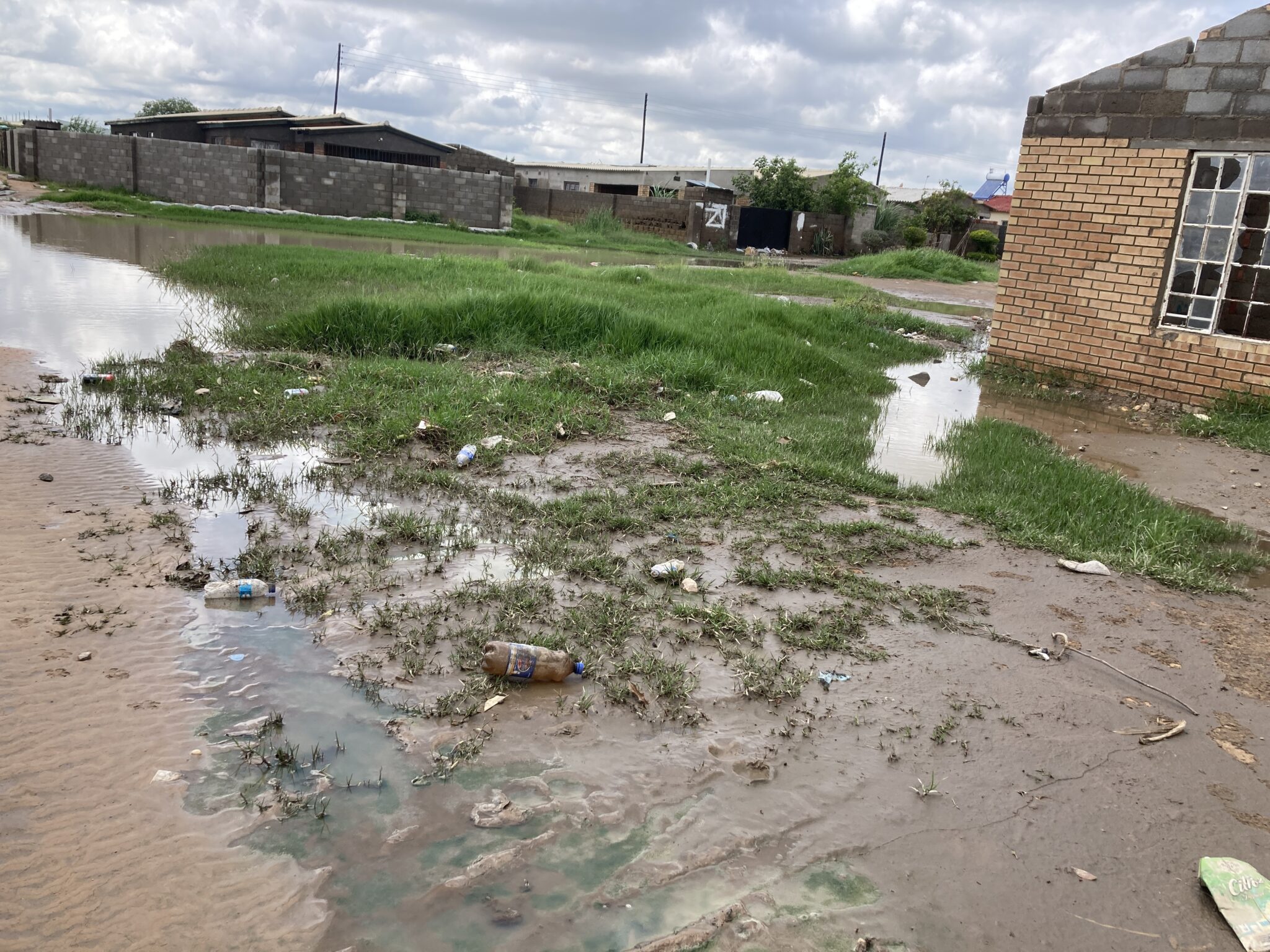As persistent rains continue to wreak havoc in the Cowdray Park suburb of Bulawayo, residents of the Garikai/Hlalani Kuhle segment are facing severe flooding, with many now forced to elevate their properties using bricks to avoid water damage.
The area, originally established by the government in the aftermath of Zimbabwe’s 2005 Operation Murambatsvina, has been struggling with inadequate infrastructure, including a lack of a proper drainage system.
During a meeting attended by various government departments, including the Civil Protection Unit (CPU) and council representatives to assess the situation on the ground, Tswagai Fikile Marovatsanga, the Director of Local Government in Bulawayo, promised that a drainage system would be installed as soon as the rains subside. However, immediate challenges remain daunting, as heavy rainfall has caused widespread flooding, leaving houses submerged.
The housing project, handed over by the government to the Bulawayo City Council (BCC) in 2009, lacked essential services like drainage. Despite efforts to address the issue, flooding continues to threaten the lives and property of residents.
The situation may worsen as the Meteorological Service Department of Zimbabwe (MSD) has predicted normal to above-normal rainfall across the country for the 2024-2025 rainfall season. Several suburbs have been experiencing daily downpours since Christmas.
Residents’ hopes for an immediate solution faded when BCC Acting Director of Works Engineer Methusi Dibidi explained that there is little they can do while it is still raining. “The challenge is that when it’s raining like this, it’s difficult to even put a grader or anything to create a trench; it’s going to get stuck,” he said.
“We can’t even dump gravel into the water. The solution is to install a proper drainage system, but in this situation, it’s difficult for us to do any excavation work because there is water and mud,” said Engineer Dibidi.
However, residents voiced their dissatisfaction with promises that have gone unfulfilled over the years. “Every year you come here promising us the same thing—that you will address it when there is no rain.”
Frustrations among residents have been mounting, with some fearing for the safety of their children, especially with schools set to open next week. Many expressed concerns about the risk of their children drowning or being unable to leave their homes due to flooding.
“My house is not even on the list for relocation, but it’s where the water passes. If we are waiting for the relocation of those residents, I don’t know what will become of me and my children. Maybe you are not removing them today or tomorrow; two or three years later, where will I be?” said one woman, her voice shaking.
Marovatsanga reaffirmed that a drainage system will be constructed to address the issue as soon as the rains subside.
“We are here in Cowdray Park because residents are complaining about flooding. We had representatives from the civil engineering department and National Civil Protection Unit from Harare come to assess the disaster. We have seen the damage that is present; resources permitting, we need to implement a drainage system because there are houses constructed on top of a streamway. A drainage system will be put in place to alleviate these problems,” she said.
“The drainage will be installed as soon as the rains subside; these are some of the programs and projects underway for the City of Bulawayo,” she added.
Ward 6 Councillor Nkosinathi Hove Mpofu noted that some residents have even deserted their homes due to flooding.
“We have all departments of Central Government here today along with engineers from the council. The challenge is flooding; there is now a disaster because some people have abandoned their homes due to flooding. Residents’ properties have been damaged because of water. This side of Cowdray Park—segments 11, 12, and 12B—has no drainage; proper drainage is the only solution,” he said.
Hove-Mpofu explained that when he raises this issue with the council, they say that the project was handed to them in 2012 but lacked funding for servicing.
“That’s why I requested that government departments and council representatives come here to map out a solution,” he said.
He added, “As we speak now, the resolution is that some houses selected for relocation will be moved for drainage purposes. They are currently preparing centers where these people may be temporarily housed. The engineers identified 18 houses that need to be evacuated so that drainage can be implemented.”
Meanwhile, Engineer Methusi Dibidi stated that servicing Cowdray Park (provision of water, sewerage, and roads) in Hlalani Kuhle/Garikai residential areas has been adversely affected by a lack of funding.
He explained that the project is a self-financing scheme where residents are expected to contribute towards development.
“At handover time from the government, residents agreed to pay US$50 in monthly installments; however, 75 percent failed to comply, resulting in contributions being reduced to US$15 per month—now ZWG15,” said Dibidi.
Eng Dibidi noted that priority has been given to providing water, which is now 97 percent complete; sewer reticulation is 33 percent complete; while roads and storm drainage are only four percent complete.
He highlighted that many stands were located within watercourses and these would need relocation to pave way for an effective drainage system.
Eng Dibidi also mentioned challenges related to identifying suitable locations for affected residents and securing funding for drainage and compensation for property owners impacted by these changes.
“We have identified affected residents and notified them to stop developing their stands. The next stage is evaluating their developments, which is expected to start in February this year,” he said.
Another resident, Thembekile Moyo, noted that flooding issues began around 2013.
“We have decided to elevate our properties because when we are not at home and it rains, our belongings often get drenched. The furniture has been affected; I started staying here in 2013 without any issues until road construction resumed,” Moyo explained.
The CPU donated rice, milk, and tinned beef to residents affected by flooding.

